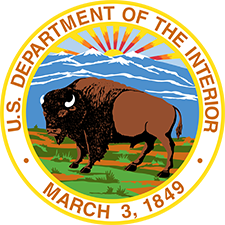25 CFR Part 36.94 BIE Residential Handbook GUIDANCE DOCUMENT
Homeliving Programs (25 CFR 36, Subpart G) and School Closure and Consolidation
25 CFR Part 36.94 BIE Residential Handbook GUIDANCE DOCUMENT
OMB: 1076-0164
Residential Handbook
(Guidance Document)
SCHOOL YEAR Insert School Year here
“A Guide for Students, Parents, Community Members and Staff”
Insert School Cover Page (logo)
Insert School Site Information
School Name
Address
Phone/Fax
Bureau of Indian Education U.S. Department of the Interior
TABLE OF CONTENTS
LETTER FROM THE ASSOCIATE DEPUTY DIRECTOR…………………...………………………………….3
LETTER THE FROM PRINCIPAL………………………………………………………………………………..4
LETTER FROM THE SCHOOL BOARD PRESIDENT……………………………………………………….....5
SCHOOL CALENDAR…………………………………………………………………………………………….6
RESIDENTIAL DIRECTORY, SCHOOL STAFF AND SCHOOL BOARD MEMBERS.....................................7
INTRODUCTION AND BUREAU OF INDIAN EDUCATION......................................................................…...8
BUREAU OF INDIAN EDUCATION ADD OFFICE....................................................................................…..8-9
MESSAGE ON: SCHOOL BOARDS, WELLNESS, CHILD ABUSE AND NEGLECT……………………. 9-10
COMPLIANCE WITH ANTI-DISCRIMINATION LAWS AND CONFIDENTIALITY……………………...10
SCHOOL VISION AND MISSION STATEMENT………………………………………………………………10
RESIDENTIAL PROGRAM……………………………………………….……………………………………..11
RESIDENTIAL DAILY OPERATION………………………………………………………………………...…11
DAILY SCHOOL SCHEDULE…………………………………………………………………………………...12 HOMELIVING POLICIES AND PROCEDURES..........................................................................................…...13
Student Check-Out Policy……………………………………………………………………………..13-14
Medication Administration Policy……………………………………...…………………………………14
Violence/Bullying Policy………………………………………………………………………………14-15
Drug and Alcohol Policy…………………………………………………………………………………..15
Computer Usage Policy……………………………………………………………………………......15-16
Transportation Policy…………………………………………………………………………………..16-17
Dress Code Policy…………………………………………………………………………………………17
Isolation Policy……………………………………………………………………………………...…17-18
Infectious Disease Control Policy…………………………………………………………………………18
Visitor Policy…………………………………………………………………………………………..18-19
Vehicle Policy……………………………………………………………………………………………..19
School Search and Seizure Policy……………………………………………………………………..19-21
Electronic Device Policy…………………………………………………………………………………..21
Emergency Procedures and Contact Numbers………………………………………...………………21-22
Public Display of Affection………………………………………………………………………….........22
Discipline…………………………………………………………………………………….……..…22-30
Grievance Procedures…………………………………………………………………………………..…30
School Bank Procedures…………………………………………………………………………………..30
Parent/Student Rights and Responsibilities……………………………………………………………30-32
What to Bring to the Residential Hall...…………………………………………………………………...32
Housekeeping.……………………………………………………………………………………………..32
Appropriate Room Décor.………………………………………………………………………………....33
Laundry…………………………………………………………………………………………………....33
School Activities and Field Trips…………………………………………………………………………33
Student Mail.………………………………………………………………………………………………33
Damage to School Property……………………………………………………………………………….33
Telephone Use……………………………………………………………………………………….……34
APPENDIX
APPENDIX A - BIE Suspected Child Abuse/Neglect (SCAN) Reporting Protocol……………………..38
APPENDIX B - BIE Student Check-Out Procedures Memorandum dated April 13, 2010…………..40-41
Parent/Guardian and Student Agreement Document…………………………………...42
APPENDIX C - November 4, 2015, Memorandum: Medication Administration at BIE-Operated
Schools and Dormitories……………………………………………………………..44-53
APPENDIX D –
LETTER FROM ASSOCIATE DEPUTY DIRECTOR
Insert annual welcome/introduction letter here.
Bureau of Indian Education
Insert up-to-date contact information here for the appropriate ADD office here.
LETTER FROM SCHOOL PRINCIPAL
Insert annual welcome/introduction letter here.
LETTER FROM SCHOOL BOARD PRESIDENT
**OPTIONAL**
Insert annual welcome/introduction letter here.
If a letter is obtained by from the school board, then insert the letter here. If there is no letter, then delete this page.
APPROVED SCHOOL CALENDAR
Insert up-to-date school year calendar here.
The Hardworking Residential Team!
Insert up-to-date residential program directory, including contact information for school administrative staff and school board members. List each staff and school board member by their title and phone number contact if applicable.
INTRODUCTION
This manual provides information for parents, students, community members, and staff about what is expected and offered at the (fill in school name here) Residential Hall. This Handbook is promulgated in accordance with 25 C.F.R. Part 36.
BUREAU OF INDIAN EDUCATION (BIE)
VISION STATEMENT
“Uniting to promote healthy communities through lifelong learning.”
MISSION STATEMENT (25 C.F.R. 32.3):
To provide quality education opportunities from early childhood through life in accordance with the Tribes’ needs for cultural and economic well-being and in keeping with the wide diversity of Indian Tribes and Alaska Native villages as distinct cultural and governmental entities. The Bureau shall manifest consideration of the whole person, taking into account the spiritual, mental, physical, and cultural aspects of the person within family and Tribal or Alaskan Native village contexts.
PROGRAM GOALS
All students will meet or exceed academic proficiency levels in reading and/or language arts, science, and mathematics
All schools will provide a safe and secure environment by decreasing incidents of violence and substance abuse by a minimum of 2% annually
Student attendance will meet or exceed the United States rural attendance rate
All schools will enhance the professionalism of all staff to improve education programs for student success through:
requirements for staff to have appropriate certification;
comprehensive systemic and on-going professional development;
recruitment and retention of highly qualified educators; and
development of leadership using best practices
High school graduation rates will be 95% or higher
Each school will provide curriculum and instruction in Tribal languages and/or cultures as approved by the local school boards
BUREAU OF INDIAN EDUCATION insert applicable ADD office information here
Insert applicable ADD description here, including contact information for the assigned Education Program Administrator
MESSAGE ON SCHOOL BOARDS
The school boards and Insert applicable ADD here strive to ensure that every student graduates fully prepared for college, or career readiness. Each school board acts in accordance with the policies outlined in 25 CFR and 62 BIAM to effectively support students, families, and community.
MESSAGE ON WELLNESS
We encourage students and their families to practice traditional concepts of wellness, and to take measures to address their physical, mental, and spiritual well-being. In addition to academic instruction, the schools will take measures to provide nutritious food and provide students structured physical activities for a minimum of one hour every weekday, and two hours on Saturday and Sunday. Further, the residential program will provide native language and cultural activities. We encourage students and their families to eat healthy, exercise, and maintain their mental health so that students can reach their full academic potential.
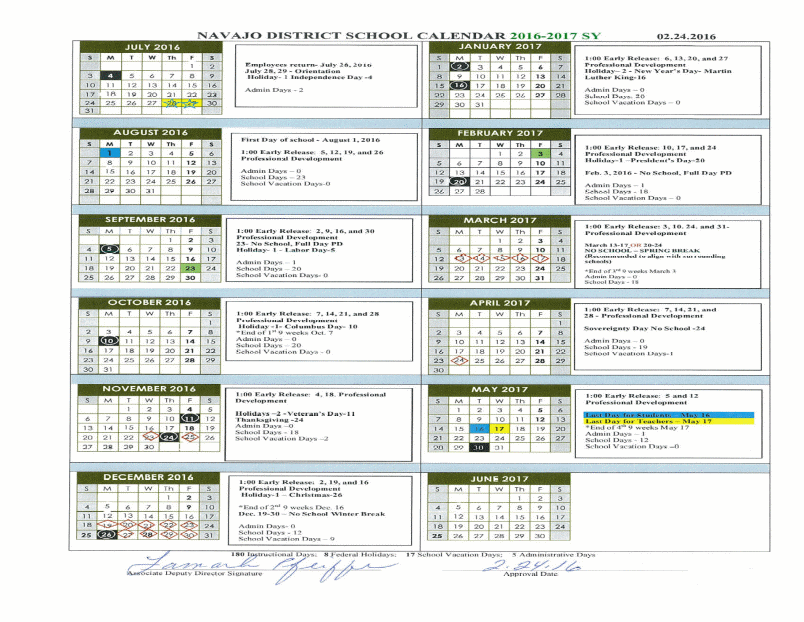
MESSAGE ON CHILD ABUSE AND NEGLECT
All suspected cases of child abuse and neglect will be reported in accordance with the BIE’s Suspected Child Abuse/Neglect (SCAN) Reporting Protocols. For access or further information on the protocol, contact the Residential Supervisor, or visit the Bureau of Indian Education website at: http://www.bie.edu/Programs/SSS/index.htm. The website will explain the Suspected Child Abuse/Neglect Reporting Protocols. Additional information about SCAN will be attached as Appendix A.
COMPLIANCE WITH ANTI-DISCRIMINATION LAWS
The Residential Hall will comply with the requirements of Title IX of United States Education Amendments of 1972, Section 504 of the Rehabilitation Act , 29 U.S.C. § 794, and 20 U.S.C. §§ 1681–1688, Pub L. No. 92‑318, and its implementing regulations (34 C.F.R. part 106). Further, no individual, on the basis of race, sex, color, national origin, disability, religion, age, sexual orientation, or status as a parent, shall be excluded from participation in, be denied the benefits of, or be subjected to discrimination in, a federally conducted education or training program or activity (Executive Order 13160).
CONFIDENTIALITY
The Bureau of Indian Education protects the confidentiality of personally identifiable information regarding students in accordance with tribal, state and federal laws dealing with regular and special education students’ rights and privacy. The foundation of the rights and laws comes from federal legislation titled, Family Educational Rights and Privacy Act of 1974. All students are covered by the regulations contained in Chapter 12 known as Students’ Rights and Responsibilities. It is the intent of this policy to inform both parents/guardians and eligible children (e.g., students eighteen and older) of their rights in the collection, maintenance, release, and destruction of records.
SCHOOL VISION AND MISSION STATEMENT
Insert your school’s vision and mission statement here.
RESIDENTIAL PROGRAM
Insert your residential program here. Make sure you insert program information that adheres to the 25 CFR Part 36 residential requirements and other program(s) your school offers:
Behavioral Health Program (a.k.a. School Counseling Program)
Tutoring Program
Native Language and Culture Program
Recreation Program (e.g. Sparks)
Wellness Program (e.g. Life Skills)
Other Residential Program
RESIDENTIAL DAILY OPERATION
Insert a paragraph to explain to the reader about your residential daily operations. For example, is your residential program a 4, 5 or 7 day program? What time does the residential open and close? Do you transport students on Friday? Do you pick-up students on Sunday?
Insert here a daily school and residential operations matrix. See example below:
WEEKDAY (MONDAY-FRIDAY) SCHEDULE:
6:00am-7:30am Students awake to prepare for the school day
7:30am-8:00am Breakfast
8:00am-3:00pm Attend School
3:00pm-3:15pm After School Check-in (Accountability)
Etc.
10:00pm Lights out
Insert a paragraph to explain the residential weekend schedule. If your residential program is closed for the weekend (transport on Friday and open on Sunday), then a paragraph is not needed.
ACADEMIC SCHOOL SCHEDULE
Insert here the school’s class schedule or academic daily schedule.
HOMELIVING POLICIES AND PROCEDURES
I. STUDENT CHECK-OUT POLICY
Students may be checked out in accordance with the BIE Student Check-out Procedures attached as Appendix B. Below are the requirements for checking out a student:
Only immediate family can check-out students. Immediate family is defined as a mother; father, brother, sister, grandparent, uncle and aunt. Parents or legal guardians are required to submit a list of person(s) authorized to check-out a student. No exceptions for check-out will be granted to anyone without a written and signed request by the student’s parents or legal guardians.
School personnel will not be allowed to check-out student(s) at any time (e.g. overnight, weekdays and weekends), unless they are the parent/guardian of the student.
Check-outs during the academic day by School personnel shall be restricted to sanctioned School activities only.
All check-outs must conclude by 9:00 p.m. curfew unless pre-approved by staff in charge at the time of check-out.
Parents or legal guardians may designate, in writing, family members who are authorized to check-out their child overnight. Authorization and approval in writing will state conditions and restrictions of check-out.
Check-out request via telephone will not be approved, except in situations of a family emergency involving a serious illness or death of an immediate family member are involved.
All students authorized for check-out are expected to return to the School campus at the specific time of return, as stated in their approved check-out request.
When there is evidence that the welfare of the student is at risk, the School reserves the right to refuse or cancel the check-out.
If a conflict arises concerning the student check-out process, the school supervisor or acting designee reserves the right to revoke any check-out privileges.
Student(s) must be in good academic standing in order to be checked out when they will be absent for class. The only exception to this would be in an emergency situation.
No student, regardless of age, shall be authorized to check themselves out (e.g. self-check-out) even if the student is 18 or older. Students may not be checked-out by an adult less than 25 years of age or by anyone (including family members) under the influence of alcohol or drugs. The two exceptions to the 25 year age requirement will be if the parents/guardians are under 25 year of age, or if the student is under the custody of a family member who is under the age of 25. If the adult’s age is in question, School officials will verify the adult’s age.
Student may not be checked out until any applicable restriction is served (e.g. In School Suspension or In Dorm Suspension). Exceptions, based on emergency situations, must be approved by School Officials.
In the event of local emergencies, e.g. natural disasters, fire or threatening weather conditions, any previously approved check-outs may be cancelled without prior notice.
Students involved in inappropriate activity while in checked-out status may have their check-out rights cancelled and will face disciplinary actions upon their return to the campus depending on the severity of the infraction.
A parent/guardian and student agreement signature form will be attached as Appendix B. This form will be completed by all parents/guardians and students. The form will be completed during registration at the School.
II. MEDICATION ADMINISTRATION POLICY
Medications will be administered in accordance with the BIE’s Medication Administration Policy which is attached as Appendix C.
III. VIOLENCE/BULLYING POLICY
** Optional, insert additional school specific information to the sample below.
A. NO INTIMIDATION/SEXUAL HARASSMENT/ABUSE/THREATS/BULLYING
The following behavior is not permitted and is subject to discipline in accordance with the policy outlined below. Further, violation of these policies will result in parent notification, and may result in notification of local law enforcement.
Physical Abuse: Includes but is not limited to, any physical contact not invited by the recipient including hitting/kicking/pinching, spitting on someone, tripping/pushing, taking or breaking someone’s things.
Sexual Harassment: Includes but is not limited to, any physical or verbal act of a sexual nature that is unwanted or not invited by the recipient. Sexual harassment can also include body gestures, innuendos, creating a sexually hostile environment through use of sexually explicit materials such as calendars, magazines, or other graphic materials.
Verbal Abuse: Includes but is not limited to, any derogatory speech directed at an individual or spoken in a public setting. This includes vulgarity, cursing, and sexual innuendo (e.g., calling someone a ‘b-word’ or using the “F” word is considered harassment). Verbal abuse also includes teasing, name-calling, taunting, and threatening to cause harm.
Nonverbal Abuse: Includes but is not limited to, rallying other children not to be friends with someone, spreading rumors, or causing someone to be subject to public ridicule.
B. HAZING
Hazing activities, such as initiations, harassment, humiliation, and ridicule will not be tolerated. Hazing includes any intentional or reckless act committed by a student, whether individually or with others, in- person, or in writing, against another student with a substantial risk of potential physical injury, mental harm, or degradation.
C. BULLYING
Bullying is prohibited in the Residential Hall, property immediately adjacent to the Residential Hall, at Residential Hall-sponsored or School-related events whether on or off Residential Hall property, at the bus stops, and on the buses or other vehicles owned, leased, or used by the Residential Program.
Students or parents of students who are being bullied should report their concerns to the School Officials.
IV. DRUGS AND ALCOHOL POLICY
Optional, insert additional school specific information to the sample below. You can delete the sample if desired.
The Residential Hall and School campus are drug free environments. No alcohol, drugs, smoking or chewing tobacco, or other controlled substance, or related paraphernalia are allowed in the Residential Hall, on Residential Hall property, including surrounding grounds, in Residential Hall vehicles/buses, or at Residential Hall sponsored activities. Violation of this policy will be dealt with in accordance with the disciplinary process.
V. COMPUTER/INTERNET USAGE POLICY
Optional, insert additional school specific information to the sample below. You can delete the sample if desired.
The primary purpose of the internet connection is for educational pursuits. In formulating this policy, the School recognizes that students have a constitutional right to freedom of speech. However, that right is not unlimited, and we encourage students to be thoughtful about their words and actions.
The system administrator and the Residential Supervisor have determined what constitutes inappropriate use of the School’s computer system and equipment. Inappropriate use includes but is not limited to the following activities:
Sending or displaying offensive/ pornographic/threatening/subversive images and messages;
Accessing, viewing, or transmitting material related to drugs, alcohol, gangs, sexual activity, or hate groups;
Tampering with or damaging School computer equipment and/or system;
Violating copyright laws;
Allowing others access to username and password;
Using another user’s username and password. Trespassing in another user’s account, folders, and/or files;
Intentionally wasting limited resources, such as forwarding chain letters; streaming internet radio or video; downloading music, video, or software;
Using a proxy server to bypass system network filters and controls;
Using the Schools BIE internet system for commercial activities, or making personal purchases;
Participating in chat rooms or other live communication;
Cyberbullying which may include mean text messages or emails, rumors sent by email or posted on social networking sites, and embarrassing pictures, videos, websites, or fake profiles.
Violations will result in loss of access, confiscation of equipment, and/or further disciplinary or legal action, and:
Any cost/expense incurred by the user becomes the liability of the user.
The user will be billed by the School for loss/damage to the computer system and/or equipment as a result of inappropriate use as listed above.
All computer network usage is subject to BIE/Federal filtering and monitoring. Therefore, be reminded there is no expectation of privacy.
Students must have a current signed Student Computer/Internet Usage Policy and Agreement on file before they can use the internet on any of the School computers. The School’s Wi-Fi network is limited to School-purchased devices.
VI. TRANSPORTATION POLICY
Optional, insert additional school specific information to the sample below. You can delete the sample if desired.
(Insert school specific bus service/schedule with time, and designated bus stops)
Residential students may occasionally ride the day bus to commute to and from their residences. Please remember that riding the bus is a privilege maintained by good behavior. Students are required to follow all School rules and procedures to ensure the safety of all on the bus. Unacceptable behavior, and violation of the bus rules while on the bus, may result in restrictions or suspension of bus privileges. If bus privileges are suspended for more than 5 days, students can appeal the suspension in accordance with the appeal process outlined below. The School provides daily bus service for day students, and will only stop at designated locations.
Bus Change Requests (insert school change request) - A student must have a temporary bus pass in order to ride a different bus from the one assigned. To be eligible to receive a temporary bus pass, a parent must give written notice or call by 11:00 a.m. on the same day.
Activity Bus Run (insert school bus/activity run if your school has one. If not delete this bullet)
Transportation Cancellation due to Inclement Weather (Insert your schools weather plan)
Bus Rules (insert school bus rules add/delete as needed) - "Don't Lose Your Riding Privilege"
Be on time
Have respect for others and for the driver
Remain in your seat
For safety, keep the aisle and exits clear
Be courteous. Never use foul language or obscene gestures.
Keep all body parts inside the bus
Use of tobacco, alcohol, & drugs is prohibited
No food or drinks on the bus
Do not damage any part of the bus; you and your parents will be responsible for repairs
For your own safety, do not distract the driver
Listen to the bus driver
VII. DRESS CODE POLICY
Optional, insert additional school specific information to the sample below. You can delete the sample if desired.
Students are required to conform to the School’s dress code from the time they arrive on School property until they depart from School property. This includes the School bus, academic building (if not a peripheral dormitory) and the Residence Hall.
Logos/graphics on clothing (tops/bottoms) and accessories (backpacks, purses, bags, belts, shoes, wristbands, shoelaces, coats, head gear, gloves) must NOT contain foul language, skulls, sexual innuendo, references to sex, drugs, alcohol, violence, and/or death
Bottoms/lower body clothing (pants, short cuts, and skirts) must fit at the waist line and shall not be more than 3” above the knee
Tank/muscle tops and tube/halter tops are not allowed
Clothing must cover cleavage, bellies, shoulders, backsides, and undergarments should not be visible
Leggings/jeggings can be worn under a tunic, skirt, or dress but not alone
Students should wear proper footwear
Gang-related attire, accessories, insignia, and colors are prohibited
Chains, spikes, brads, adornment, or any other accessories that may be used as a weapon or damage School property are NOT permitted
Face painting, masks, and excessive makeup that hide one’s face is not allowed
Hair styles or body modifications that cause distraction to the education process are not permitted
The use of non-prescription decorative contact lenses (e.g., cat eyes, vampire eyes) that causes distraction to the educational process is prohibited
Head gear (hat, hoodie, beanie, and visor) is not to be worn in any building on campus during School hours
Personal headphones/ear buds are to be kept out of sight while in any building on campus
(Schools may insert their uniform policy here)
VIII. ISOLATION/SEPARATION POLICY
Optional, insert additional school specific information to the sample below. You can delete the sample if desired.
All residential students will be transported by School officials in an approved School vehicle for basic medical, dental, vision and other health services. Parents/Guardians will be notified of any medical appointments or medical issues. External transportation services may be used (e.g. ambulance, fire truck, helicopter, etc.) for emergencies. There are designated isolation rooms for girls and boys. If medical personnel determine that a student should not remain in a dormitory setting, the student’s parent/guardian will be contacted to come get the student, or if necessary a staff member will transport the student home. Students will remain in the isolation room until a parent/guardian can be contacted and arrangements made to transport the student. When a student is placed in the isolation/separation room he/she will be monitored closely. At the minimum, visual checks on the student will be made every ten minutes.
IX. INFECTIOUS DISEASE CONTROL POLICY
Optional, insert additional school specific information to the sample below. You can delete the sample if desired.
The following guidelines were developed by the Bureau of Indian Education in collaboration with Indian Health Services to reduce the spread of communicable diseases in dormitories. These guidelines will be followed in any communicable/infectious disease situation.
If a student is believed to have a communicable or infectious disease the residential staff will immediately notify, the home living supervisor or designee. The Residential Hall Supervisor or designee in charge will:
Take the student to the nearest hospital (Indian Health Services or private) for an evaluation.
Contact the student’s parent/guardian.
Work with Indian Health Service (IHS) or other appropriate medical personnel to determine if isolation/separation of any student is necessary.
If necessary, place the student in a designated isolation room in the dormitory and ensure the student is checked every 10 minutes.
Control the transmission of the communicable disease in the dormitory.
If appropriate notify parent/guardian in writing of:
The disease to which the child was exposed, and whether this is one case or part of an outbreak.
Signs and symptoms of the disease that the parent should watch for in the child.
How the disease is spread.
The incubation period of the disease (when they might see symptoms appear).
How many days or weeks the disease can spread from person to person (period of communicability).
Disease prevention measures recommended by a Public Health Nurse or Sanitarian.
The control measures implemented at the School.
Re-admittance:
If a student has been taken out of the Residence Hall and had a communicable or infectious disease prior to returning to the Residence Hall/School the student must provide a doctor’s statement stating the student is medically cleared to return. Further, a meeting with the student’s parent/guardian may be required.
X. VISITOR POLICY
Optional, insert additional school specific information to the sample below. You can delete the sample if desired.
The safety and security of staff and students at (Insert school information here) is of the utmost importance. A critical part of creating a safe campus environment is for School Officials to have advance knowledge of all visitors. School Officials must know who is on campus at all times, and reserves the right to refuse entry to any visitor. Any visitors (individuals not currently enrolled at or employed by each school) must sign-in at the Residence Hall staff office upon arrival to receive an official Visitor’s Pass. Visitors are not allowed beyond the front entrance of the Residence Hall without an escort or proper clearance. Students and staff are expected to inform the residential staff of the presence of any unregistered visitor on campus.
Residential student curfew is at 9:00 p.m. Parents/Guardians are encouraged to visit their child between the visitation hours of 7:30 a.m.-9:00 p.m. ONLY the parent/guardian will be allowed visit their child after 9:00 p.m., and such visitation shall occur in the front lobby area of the Residence Hall. The parent will have to physically walk into the Residence Hall for all check-outs. Students will not be allowed to meet their parent/guardian in the parking lot. This is to ensure safety and accountability.
During the school year, school sponsored closed events (such as dances/prom) are only for current enrolled school students and approved guests. Visitors at such events are subject to prior approval by the Principal. Unapproved visitors will be escorted off the premises either by school personnel, or by local law enforcement authorities.
XI. VEHICLE POLICY (H.S. only)
Optional, insert additional school specific information to the sample below. You can delete the sample if desired.
(This section (XI.) can be deleted if your school is NOT a High School)
Students driving to the Residence Hall must have a signed Use of Student Parking Lot Form as well as (1) a copy of valid Driver’s License, (2) current registration, and (3) proof of Insurance with Student Name listed on file with the Residential Hall Supervisor or designee. Students are permitted to park on Residence Hall premises as a matter of privilege, not of right.
Upon submission of proper documentation a student may be issued a parking pass.
Only students with parking passes may park their vehicles in designated areas on School property.
Student vehicles are not to be parked in the housing area or any other area of the campus. Students are not allowed to leave campus in their vehicles during lunch or before the conclusion of the school day without prior written permission from their parents and administrative approval.
Students may be asked to open a locked motor vehicle under the student’s control or its compartments upon the request of a School Official in accordance with the School Search and Seizure Policy below.
Violation of the vehicle policy may result in revocation of student’s parking pass, disciplinary action, notification of parents, and referral to law enforcement.
XII. SCHOOL SEARCH AND SEIZURE POLICY
Optional, insert additional school specific information to the sample below. You can delete the sample if desired.
Students are entitled to the guarantees of the Fourth Amendment, and in accordance with the Fourth Amendment when there is reasonable suspicion that students may be in possession of drugs, weapons, alcohol, and other materials (contraband) in violation of School/Residence Hall policy or state/federal/tribal law, School authorities (including Residential Hall staff), may search any student, student locker, dorm room, furniture, or student automobile in accordance with the policy outlined below, and may seize illegal, unauthorized, or contraband material discovered in the search. A student’s failure to cooperate with searches as provided in this policy will be considered grounds for disciplinary action. School authorities may utilize canines and metal detectors to assist in searches.
To meet the standard of reasonable suspicion, School authorities must have specific and articulable facts or inferences, obtained from either personal observation or a reliable informant, that leads him or her to conclude – based on his or her experience and in the totality of the circumstances – that the search will lead to a discovery of contraband, or evidence of contraband. Examples of reasonable suspicion may include, but are not limited to, smelling marijuana or alcohol odors, observing students with drug paraphernalia or alcohol containers, observing behavior consistent with intoxication, or hearing from a credible source that a student possesses contraband on his or her person, or elsewhere on Residence Hall property.
Searches of Individuals
A student’s person and/or personal effects (e.g., purse, book bag, etc.) may be searched whenever a School authority has reasonable suspicion to believe that the student is in possession of illegal or unauthorized material. The scope of any inspection conducted under this policy shall be reasonably related to the objectives of the inspection, and shall not be unreasonable in light of the age and sex of the student and the nature of the infraction. If a pat down search of a student’s person is conducted, it will be conducted in private by a School authority of the same sex, and with an adult witness present, when feasible, and will be no more intrusive than necessary to uncover the suspected illegal or unauthorized material.
School Property
The School exercises exclusive control over School property which includes property within the Residence Hall, and the students have no expectation of privacy regarding items placed in School property because School property is subject to search at any time by School officials. The students are responsible for whatever is contained in their dorm rooms, and any furniture assigned to them. School authorities may conduct a general inspection of dorm rooms for any reason at any time without notice, without student consent, and without a search warrant.
Automobile Searches (HS only) (this paragraph can be deleted if your school is NOT a High School)
Students are permitted to park in the Residence Hall parking lot as a matter of privilege, not of right. The School retains authority to conduct routine patrols of the student parking lot, and inspect the student’s automobile if it is on School property and a School authority has reasonable suspicion to believe that illegal or unauthorized materials are contained inside. Such patrols may be conducted without notice, without student consent, and without a search warrant. Upon establishment of reasonable suspicion, School officials may require a student to open a locked motor vehicle under the student’s control or its compartments. Failure to do so may result in revocation of the student’s parking pass, disciplinary action, notification of parents/guardians, and referral to law enforcement.
Seizure of Illegal Materials
Illegal or unauthorized material which has been found in a properly conducted search will be turned over to the proper law enforcement authorities for ultimate disposition.
Use of Drug and Alcohol Tests
When School authorities have reasonable suspicion that a student is under the influence of alcohol or drugs, the student may be subjected to testing to determine whether the student is under the influence of drugs or alcohol.
Law Enforcement
Law enforcement may be contacted by the School authorities regarding incidents of illegal activity.
Use of Dogs
School authorities are authorized to utilize specifically trained canines (accompanied by trainer) for sniffing out contraband on School-owned property and automobiles parked on the School property. An indication by the dog that contraband is present on School property or in an automobile will be reasonable cause for a further search by the School authorities.
Use of Metal Detectors
School policy and law prohibit weapons of any nature on School property or at School functions. The presence of weapons is inherently dangerous to all persons in the school setting. School officials are authorized to use metal detectors when there is reasonable cause to believe that an identified student is in possession of a weapon.
XIII. ELECTRONIC DEVICE POLICY
Optional, insert additional school specific information to the sample below. You can delete the sample if desired.
Electronic devices include but are not limited to the following:
Cell phone
Digital camera
Electronic game devices (e.g., Gameboy, PSP)
Handheld video camera
Personal iPad/tablet
Laser pointer-for safety reasons, laser lights are prohibited from the School campus.
Personal music player/iPod/speakers
Portable DVD player
Personal laptop
The
school has an option to allow or not allow electronic devices during
the residential time frame. If a school elects to allow students to
have electronic devices during the residential timeframe, the
following language should be included.
Any misuse of electronic devices will result in the electronic
device being confiscated, turned in to the Residential Hall
Supervisor/School security, or designated School Official, and
returned to the student/parent at a designated time as determined by
the School Official. Violations may also result in disciplinary
action as outlined below. The School is not responsible for loss or
damage to students' personal
property brought onto the
School campus.
XIV. EMERGENCY PROCEDURES AND CONTACT NUMBERS
Optional, insert additional school specific information to the sample below. You can delete the sample if desired.
FIRE ALARMS
If the fire alarm goes off, the building will be evacuated immediately by the Residential Hall supervisor or designee in charge. Students must follow the directions of the residential staff. The fire alarm box will be checked to determine the source of the alarm. The staff will go to the source indicated to assess the risk. The staff will report the situation to the supervisor and the security guard, and call for emergency response if appropriate.
FIRE DRILLS
Two fire drills will be conducted during the first month of school (August), and one fire drill will be held each month for the remainder of the school year and summer school. During a fire drill the building will be evacuated rapidly, and in an orderly manner. Occupants of the building will not be allowed to stop and pick-up personal belongings, or re-enter the building. Once the occupants are outside of the building, an accurate account will be made of all the students, staff, and visitors. The time it took to evacuate will be noted. Evacuation plans are posted in every room, and in the hallways. Fire drills will be conducted at random times (afterschool, evening, and night).
EMERGENCY MANAGEMENT AND CONTINUITY OF OPERATIONS PLAN (COOP)
(Insert school information here) has developed a plan to prevent, detect, and respond to any emergency situation that may occur at the School. During the first month of school the residential staff will review safety protocols with students including evacuation protocols, lock down protocols, and shelter-in-place protocols. In case of an emergency, students, parents, and visitors will be given instructions and guidance by school personnel in accordance with the Emergency Management/COOP Plan. The Emergency Management /COOP Plan can be viewed at the academic front office, and Residential Hall staff office.
EMERGENCY CONTACT AND PHONE NUMBERS
(Insert school specific emergency contact and phone numbers here)
XV. PUBLIC DISPLAY OF AFFECTION (PDA)
Optional, insert additional school specific information to the sample below. You can delete the sample if desired.
Anything beyond hand-holding is prohibited and will be subject to discipline.
XVI. DISCIPLINE
Optional, insert additional school specific information to the sample below. You can delete the sample if desired
Insert you schools disciple matrix.
The residential program is a privilege and not a right. A student may be removed from the residential program based on a discipline or safety concern, but could still attend school as a day student. This type of removal from the residential program will be handled on a case-by-case basis.
DISCIPLINE LADDER
If a problem cannot be resolved by the staff member it may be referred to the administration, and administration will:
● Provide additional intervention as needed to correct problem behavior or to resolve conflicts;
● Determine appropriate consequences (e.g., lunch detention, restriction)
● Determine if suspension is appropriate
● Prepare suspension letter, set hearing dates, notify parent/guardian, review hearing rights with student.
PROGRESSIVE DISCIPLINE
The Navajo District will use a system of progressive discipline, and will attempt to implement discipline based on severity of the offense, and the repeated nature of disciplinary offenses. Accordingly, offenses are broken down into Severe, Major, and Minor as described below. Please note the following:
1. Behavior and counseling contracts will be established for all Severe (Group I) offenses.
2. Law enforcement may be notified of offenses.
3. The Administrator will make the final decision.
4. A student may be suspended from School for violations of the Residential Handbook or other School rules and regulations.
SEVERE OFFENSES (Group 1)
Severe Offenses (Group I) are those offenses that are serious in nature and, violate Navajo Nation law, and/or state law, and/or federal law. Examples of Severe (Group 1) offenses include, but are not limited to the following:
drug/Alcohol use or possession, arson, physical assault, sale or distribution of a controlled substance, inciting a riot, possession of a weapon, fighting involving a weapon, bomb threat, gang activity, etc.
CONSEQUENCES FOR SEVERE OFFENSES (Group I)
Short Suspension – 3 days or less out of school/Residence Hall with mandatory counseling
Long Suspension – 4 to 8 days out of school with mandatory counseling
Long-Term Suspension – 9 days or more days out of school, with due process hearing
Expulsion – Recommendation to the Governing Board for Expulsion
Type of Offense |
1st Offense with a Contract |
2nd Offense |
3rd Offense |
Selling/Distribution of Drugs/Alcohol |
Short or Long Suspension |
Long or Long-Term Suspension |
Long-Term Suspension or |
|
1st & 2nd Offense - Law enforcement will be notified 1st Offense – Mandatory Parent/ Student Conference – Establish a Behavioral and Counseling Contract |
Expulsion |
|
Use, Possession of Drugs/Alcohol |
Short or Long Suspension |
Long or Long-Term Suspension |
Long-Term Suspension or |
|
1st & 2nd Offense - Law enforcement will be notified 1st Offense – Mandatory Parent/ Student Conference – Establish a Behavioral and Counseling Contract |
Expulsion |
|
Fighting – Inciting a Riot or Fight, Possession of a Weapon, Fighting with a Weapon |
Short or Long Suspension |
Long or Long-Term Suspension |
Long-Term Suspension or Expulsion |
|
1st & 2nd Offense - Law enforcement will be notified 1st Offense – Mandatory Parent/ Student Conference – Establish a Behavioral and Counseling Contract |
|
|
Gang Related Activities (including but not limited to recruitment, initiation, threatening or other equivalent behavior) |
Short or Long Suspension |
Long or Long-Term Suspension |
Long-Term Suspension or |
|
1st & 2nd Offense - Law enforcement will be notified 1st Offense – Mandatory Parent/ Student Conference – Establish a Behavioral and Counseling Contract |
Expulsion |
|
Arson – Bomb Threat, False Fire Alarm, Fire Works |
Short or Long Suspension |
Long or Long-Term Suspension |
Long-Term Suspension or |
|
1st & 2nd Offense - Law enforcement will be notified 1st Offense – Mandatory Parent/ Student Conference – Establish a Behavioral and Counseling Contract |
Expulsion |
|
Sexual Misconduct, Any Inappropriate Contact |
Short or Long Suspension |
Long or Long-Term Suspension |
Long-Term Suspension or |
|
1st & 2nd Offense - Law enforcement will be notified 1st Offense – Mandatory Parent/ Student Conference – Establish a Behavioral and Counseling Contract |
Expulsion |
|
Physical Assault |
Short or Long Suspension |
Long or Long-Term Suspension |
Long-Term Suspension or Expulsion |
|
1st & 2nd Offense - Law enforcement will be notified 1st Offense – Mandatory Parent/ Student Conference – Establish a Behavioral and Counseling Contract |
|
|
Other Serious or Threatening |
Short or Long Suspension |
Long or Long-Term Suspension |
Long-Term Suspension or |
Behaviors that Involve/Cause Harm to Others including Severe Bullying (e.g. encouraging someone to engage in self-harm, threatening someone, taking someone’s property with threat of force, spreading rumors that are intended to damage someone else’s reputation) |
1st & 2nd Offense - Law enforcement will be notified 1st Offense – Mandatory Parent/ Student Conference – Establish a Behavioral and Counseling Contract |
Expulsion |
|
MAJOR OFFENSES (Group II)
Major Offenses (Group II) are those offenses that can be serious in nature and may violate Navajo Nation law, and/or state law, and/or federal law. Examples of Major Offenses (Group II) offenses include, but are not limited to the following:
theft, vandalism, misuse of computers, use or possession of tobacco products, drug/alcohol paraphernalia, disorderly conduct, etc.
CONSEQUENCES FOR MAJOR OFFENSES (Group II)
Short Suspension – 3 days or less with mandatory counseling
Long Suspension – 4 to 8 days with mandatory counseling
Long-Term Suspension – 9 days or more, with due process hearing
Expulsion – Recommendation to the Governing Board for Expulsion
Type of Offense |
1st Offense with a Contract |
2nd Offense |
3rd Offense |
Possession of Drugs/Alcohol Paraphernalia |
Short Suspension
|
Long Suspension |
Long-Term Suspension |
|
1st Offense – Mandatory Parent/ Student Conference – Establish a Behavioral & Counseling Contract for Student |
|
|
Possession or Use of Tobacco Products, including E-Cigarettes |
Short Suspension
|
Long Suspension |
Long-Term Suspension |
|
1st Offense – Mandatory Parent/ Student Conference – Establish a Behavioral & Counseling Contract for Student |
|
|
Extortion |
Short Suspension
|
Long Suspension |
Long-Term Suspension |
|
1st Offense – Mandatory Parent/ Student Conference – Establish a Behavioral & Counseling Contract for Student |
|
|
Intimidation / Harassment/Bullying |
Short Suspension
|
Long Suspension |
Long-Term Suspension |
(Including but not limited to name calling, repeated incidents of minor bullying, rallying other students to bully someone) |
1st Offense – Mandatory Parent/ Student Conference – Establish a Behavioral & Counseling Contract for Student |
|
|
Hazing |
Short Suspension
|
Long Suspension |
Long-Term Suspension |
|
1st Offense – Mandatory Parent/ Student Conference – Establish a Behavioral & Counseling Contract for Student |
|
|
Vandalism and/or Theft |
Short Suspension
|
Long Suspension |
Long-Term Suspension |
|
1st Offense – Mandatory Parent/ Student Conference – Establish a Behavioral & Counseling Contract for Student |
|
|
Sexual Harassment |
Short Suspension
|
Long Suspension |
Long-Term Suspension |
|
1st Offense – Mandatory Parent/ Student Conference – Establish a Behavioral & Counseling Contract for Student |
|
|
Verbal Abuse of an Individual |
Short Suspension
|
Long Suspension |
Long-Term Suspension |
|
1st Offense – Mandatory Parent/ Student Conference – Establish a Behavioral & Counseling Contract for Student |
|
|
Gang Related Activity (Displaying gang affiliation, including showing colors, flashing signs, marking territory, displaying gang tattoos) |
Short Suspension
|
Long Suspension |
Long-Term Suspension |
Other Similar Offenses |
Short Suspension
|
Long Suspension |
|
|
1st Offense – Mandatory Parent/ Student Conference – Establish a Behavioral & Counseling Contract for Student |
|
|
MINOR OFFENSES (Group III)
Minor Offenses (Group III) are those that may be characterized as disruptive in nature. Examples of Minor (Group III) offenses include, but are not limited to the following:
Insubordination, dress code violation, truancy, ditching/cutting class, leaving class or campus without permission, profanity, public display of affection, violation of reasonable standard of right/wrong, failure to produce school identification badge, general misconduct, failure to follow directions, and failure to serve detention, etc.
CONSEQUENCES FOR MINOR OFFENSES (Group III)
Verbal Warning with counseling referral
Written Reprimand with counseling referral
In-School Suspension – 1 to 4 days with mandatory counseling
Short Suspension – 3 days or less with mandatory counseling
Long Suspension – 4 to 8 days with mandatory counseling
Type of Offense |
1st Offense |
2nd Offense |
3rd Offense |
4th Offense |
5th Offense |
|||||
Public display of affection |
Verbal Warning Counseling |
Written Reprimand |
ISS/IDS 1-4 days |
Short Suspension |
Long Suspension |
|||||
|
|
Parent will be notified by certified mail. Establish a Behavioral and Counseling Short-Term Contract |
Mandatory Parent/Student Conference – Establish a Behavioral and Counseling Long-Term Contract. |
|
|
|||||
Profanity |
Verbal Warning Counseling |
Written Reprimand |
ISS/IDS 1-4 days |
Short Suspension |
Long Suspension |
|||||
|
|
Parent will be notified by certified mail. Establish a Behavioral and Counseling Short-Term Contract |
Mandatory Parent/Student Conference – Establish a Behavioral and Counseling Long-Term Contract. |
|
|
|||||
Insubordination
|
Verbal/ Written Reprimand |
ISS/IDS 1-4 days |
Short suspension |
Long Suspension |
Long-Term Suspension |
|||||
|
. |
Parent will be notified by certified mail. Establish a Behavioral and Counseling Short-Term Contract |
Mandatory Parent/Student Conference – Establish a Behavioral and Counseling Long-Term Contract. |
|
|
|||||
Dress Code Violation |
Verbal/ Warning Reprimand |
Verbal Reprimand |
ISS/IDS 1-4 days |
Short Suspension |
Long Suspension |
|||||
|
|
Parent will be notified by certified mail. Establish a Behavioral and Counseling Short-Term Contract |
Mandatory Parent/Student Conference – Establish a Behavioral and Counseling Long-Term Contract. |
|
|
|||||
Ditching classes |
Verbal/ Written Reprimand |
ISS/IDS 1-4 days |
ISS/IDS 1-4 days |
Short Suspension |
Long Suspension |
|||||
|
Parent will be notified. |
Parent will be notified by certified mail. Establish a Behavioral and Counseling Short-Term Contract |
Mandatory Parent/Student Conference – Establish a Behavioral and Counseling Long-Term Contract. |
|
|
|||||
Truancy
|
Verbal/ Written Reprimand
|
ISS/IDS 1-4 days
|
Short suspension
|
Long Suspension
|
Long-Term Suspension
|
|||||
|
Parent will be notified. |
Parent will be notified by certified mail. Establish a Behavioral and Counseling Short-Term Contract |
Mandatory Parent/Student Conference – Establish a Behavioral and Counseling Long-Term Contract. |
|
|
|||||
Leaving class or campus without permission |
Verbal/ Written Reprimand |
ISS/IDS 1-4 days |
Short Suspension |
Long Suspension |
Long- Term Suspension |
|||||
|
Parent notification &/or contact law enforcement |
Parent will be notified by certified mail. Establish a Behavioral and Counseling Short-Term Contract |
Mandatory Parent/Student Conference – Establish a Behavioral and Counseling Long-Term Contract. |
|
|
|||||
Failure to serve detention |
ISS/IDS 1-4 days |
Short Suspension |
Long Suspension |
Long- term Suspension |
Expulsion |
|||||
|
Parent will be notified |
Parent will be notified by certified mail. Establish a Behavioral and Counseling Short-Term Contract |
Mandatory Parent/Student Conference – Establish a Behavioral and Counseling Long-Term Contract. |
|
|
|||||
Tardiness |
Verbal Reprimand |
Written Reprimand |
ISS/IDS 1-2 days Mandatory Parent/Student Conference – Establish a Behavioral and Counseling Long-Term Contract. |
Short Suspension
|
|
|||||
Violation of reasonable standards of |
Verbal Reprimand |
Written Reprimand |
ISS/IDS 1-4 days |
Short Suspension |
Long Suspension |
|||||
right/wrong/ Bullying (including but not limited to name calling, excluding someone, deliberately disregarding someone else’s feelings |
|
Parent will be notified by certified mail. Establish a Behavioral and Counseling Short-Term Contract |
Mandatory Parent/Student Conference – Establish a Behavioral and Counseling Long-Term Contract. |
|
|
|||||
DISCIPLINE TERMS DEFINED
Student Conference
A staff member will meet individually with the student in an effort to reduce or eliminate minor misbehavior.
Parent Contact
Staff member will contact parent via phone, email, mail, or in person regarding student minor misbehavior in an effort to elicit support/reinforcement of positive school behavior from home.
In-School Suspension (ISS)
Prior to in-school suspension each student and their parent/guardian will be notified of the offense(s) leading to the ISS, and the duration of the ISS. Students serving an ISS will report to school at the usual start time, but will be assigned to a special room to be supervised by School officials for the duration of the school day. Prior to commencing an ISS, the student will inform each of his/her teachers that they are serving an ISS and will collect any classwork that will be missed due to his/her ISS. On each assigned day of ISS, each student assigned to ISS is responsible for arriving on time and being prepared (student should bring all assigned classwork, any incomplete assignments, and something to read). Failure to do so may result in additional ISS. During ISS, students will not be allowed to interact with their peers. ISS students will eat lunch in the ISS room.
In-Dorm Suspension (IDS)
Prior to in-dorm suspension each student and their parent/guardian will be notified of the offense(s) leading to the IDS, and the duration of the IDS. Students serving IDS will report to the Home living Supervisor or designee when checking back in from home or after school to begin the intervention.
Parent Conference w/ Behavior Contract
Student and parent will meet with an Administrator to write and agree upon a behavior contract which includes any of the aforementioned Interventions and/or but not limited to a combination of any of the following additional interventions:
Community service
Peer or staff mentor with required contact
Counseling
Suspension from extra-curricular activities (including sports, after school activities, field trips)
After school homework
Family member to attend classes with student
All-day academic support
DISCIPLINE APPEALS-PROCEDURAL DUE PROCESS
Information in this Handbook informs the students of their rights and responsibilities, Residence Hall rules, and regulations governing behavior, and consequences for infractions of Residence Hall rules and regulations. Every student and his/her parent(s)/guardian(s) needs to study and know the Residence Hall rules and regulations as well as their due process rights and responsibilities.
This section does not apply to any discipline EXCEPT suspension of 10 days or more, denial of enrollment, expulsion, or suspension from the bus service.
The School will work with students involved in infractions as detailed earlier in this Handbook in order to help students to reach their academic potential and overcome problems. However, in cases of severe/major infractions of school rules or repeated violations, students may be suspended for more than 10 days, or expelled. In cases where suspension exceeds 10 days, or the student is expelled, the student will be entitled to the due process rights outlined in this section.
Due Process Hearing (25 CFR § 42.7)
The Hearing will be held by the Principal or the Principal’s designee. The Principal may suspend or expel a student immediately when there is evidence that the student poses a serious and immediate danger to the health or safety of himself /herself or others. However, if a student is suspended or expelled prior to a hearing, a hearing must be held within ten days. If a student is not expelled or suspended prior to a hearing, the hearing will be held at the most reasonable time and as close as possible to the alleged infraction. All hearings will be closed, unless otherwise requested by the student/parents. It is essential that the each student be given an opportunity to present their defense against the charges made against them, and that the proceeding be fair and impartial.
Notification (25 CFR §42.7(a))
Parents and students will be notified of charges within reasonable time prior to the hearing.
Specific Student Hearing Rights and Procedures (25 CFR § 42.8)
The student has the right to:
Not to be compelled to testify against himself or herself
View documents and related records including written findings of fact and conclusions.
Request deferral (delay) of hearing: The request must be in writing. The request must clearly state a reason for deferral. The request must be submitted to the Principal two days prior to the hearing
A private hearing
Representation by legal counsel (at student/parent’s expense)
Presence of a student, parent/guardian or their designee
Translator, if requested
Appear on his/her own behalf
Produce witnesses and evidence on his/her behalf and to confront and examine all witnesses
Confront and cross examine an opposing witness or for the student legal counsel to do so
To the record of the disciplinary action, including written findings of fact and conclusions
Have an allegation of misconduct and related information expunged from the student’s school record if the student is found not guilty of the charges
Administrative review and appeal under school policy
A suspended student will be on excused leave and allowed to make up any missed assignments within 3 days of his/her completion of the suspension. The student may receive failing grades for failure to attend a program of alternative education. A student can, prior to, or at the hearing, enter a plea of guilty at which time the case will immediately be referred to the Principal for review and final decision.
Appeal
A student will have the right to appeal the decision of suspension/expulsion to the Education Program Administrator (EPA) within ten days from the date of receipt of the initial decision in accordance with School policy.
DISCIPLINE OF STUDENTS WITH DISABILITIES
While students with disabilities will be held accountable for their actions, any disciplinary action taken against a student identified with a disability will be done in accordance with all applicable laws and regulations. Discipline of students with disabilities may require additional processes and procedures not identified in this section such as manifestation hearings, and reasonable accommodations. The processes and procedures required for discipline of a student with disabilities are fact dependent, and will be determined on a case-by-case basis.
XVII. GRIEVANCE PROCEDURES
Optional, insert additional school specific information to the sample below. You can delete the sample if desired.
Student/Parent - Employee
If a parent and/or a student has a conflict with staff, the following process should be used. This section does not apply in the case of any physical or sexual abuse. Physical or sexual abuse (including verbal sexual harassment) should be immediately reported to the Principal, and/or local law enforcement. If the differences are not settled informally between student/parent and staff, it is the right of the parent/student and/or the staff to go to the employee’s supervisor who will act as the mediator. Both sides of the dispute have the right to present a written or verbal statement and answer to the grievance.
Student - Student
If a conflict arises between students, the student should report the conflict to a staff member for advice on how the conflict can be resolved. If students’ differences are not settled informally, it is the right of the student to go to a teacher/counselor, Principal, or the Residential Hall Supervisor. Both sides of the dispute have the right to present a written or verbal statement and answer to the grievance.
XVIII. SCHOOL BANK PROCEDURES
Optional, insert additional school specific information to the sample below. You can delete the sample if desired.
To prevent theft, students should not have more than $100 in their possession at any time. If a student has more than $100, they should secure the excess funds by following the school procedure below:
Insert your school bank procedures here. Make sure you address the following:
Who handles all the money? School Banker if your school has one. If not, who is assigned this task?
How will a student check be cashed?
XIX. PARENT/STUDENT RIGHTS AND RESPONSIBILITIES
Optional, insert additional school specific information to the sample below. You can delete the sample if desired.
PARENT/GUARDIAN RIGHTS AND RESPONSIBILITIES
(Insert school information here) recognizes that parents or guardians are our most important partners in a child’s education. Parental involvement is essential for a student’s educational success. The School urges you to understand and exercise your rights and responsibilities.
Parental Responsibilities
You have the responsibility to read and understand the rules.
You have the responsibility to ask School Officials to help you understand these rules if necessary.
You have the responsibility to ensure that your student stays for classes from the start of school to the end of the school day, Monday through Friday.
You have the responsibility to bring your student back to the Residence Hall before school starts either on Sunday evening or Monday morning so your student can be present in their 1st hour class. If your student does not make it to class on Monday morning, it is the parent/guardian’s responsibility to call and inform the Residence Hall and the School to explain the truancy.
Parental Rights
You have the right to see and read your child’s record (e.g., attendance, grades, test scores, referrals, incident reports. etc.). If you have questions, ask a counselor, teacher, or administrator, to help you understand the information and the use of these records. Keep the information of these records confidential because it is not public information, it is only for you, your child, School Officials, or others designated by you.
You have the right to be told what the School rules are.
You have the right to be informed of what the consequences (punishments) are for your student breaking the rules.
You have the right to appeal disciplinary action as provided for by this document and applicable law.
STUDENT RIGHTS AND RESPONSIBILITIES
Student Responsibilities
(Insert school information here) wants all students to reach their full potential. To do so, it is essential that the School is free of disruption. As a student, you are required to respect the rights of all members of the School community – teachers, administrators, parents, residential staff, support staff, and other students.
Student Rights
Freedom of expression as guaranteed by the U.S. Constitution.
Assemble and associate with other students subject to reasonable rules set by the School regarding time and place.
Publish materials provided that they are not obscene, libelous or likely to cause a disruption. The Principal or a designee must approve publications that are distributed within the building.
Organize clubs, provided the Principal approves, and a teacher agrees to be faculty advisor. All students are free to join any club. Clubs must follow rules regarding the time they meet and the use of facilities, and must not cause disruption within the School or Residential Hall.
Post bulletins on School bulletin boards provided the Principal or his/her designee has approved them. The student’s name must be on the posting. Postings cannot be obscene, libelous, or likely to cause disruption.
Vote in local, state and national elections, provided you are 18 years of age or older.
You have the right to appeal disciplinary action as provided for by this document and applicable law.
XX. WHAT TO BRING TO THE RESIDENCE HALL
Optional, insert additional school specific information to the sample below. You can delete the sample if desired.
Students can bring any items they wish that are not prohibited, and do not pose a threat to the health, safety, or welfare of others. Residential Hall staff has the right to ask students to remove items, or to confiscate items, if deemed necessary to comply with any law, regulation, or policy, or to protect the safety or well-being of the staff or residents of the Residence Hall.
Necessities:
Adequate amount of clothing (clothing based on the School uniform policy)
School supplies and school bag
Personal hygiene products (soap, toothpaste, & non-alcoholic mouthwash)
Hair products
Towels
Laundry detergent
Blanket or comforter, pillow, bed sheets
Small stereos and alarms clocks
(Insert necessities list here, add/delete as needed)
Items that are not allowed in the Residence Hall:
Large amounts of money. The maximum amount of money a student can bring to the School is $100 (see School bank procedures to manage money safely)
Items prohibited by the School dress code
Large stereo systems, large speakers, and televisions
Skateboards
Drugs/alcohol/tobacco
Any tobacco products including E Cigarettes
Cigarette lighters/matches
Fireworks
Correction fluid/paint/spray paint/markers/ pepper spray
Stink bombs/water balloons
Weapons (e.g. knives, guns, bats, clubs, darts, etc.)
Tattoo machine
Pornographic material
Animals (unless approved by the Principal and Residential Hall Supervisor)
(Insert items not allowed here, add/delete as needed)
XXI. HOUSEKEEPING
Optional, insert additional school specific information to the sample below. You can delete the sample if desired.
The Residential Hall Supervisor is responsible for the cleanliness of the Residence Hall and the grounds around the buildings. However, each student is expected to perform household chores in the residential halls. The chores should be completed before bedtime. A clean living environment enhances the spirit and the morale of the residents and employees. Cleaning assignments will be posted.
XXII. APPROPRIATE ROOM DÉCOR
Optional, insert additional school specific information to the sample below. You can delete the sample if desired.
Students will keep their rooms free from inappropriate or sexually explicit materials, including posters, magazines, videos, and video games. Bunk beds are not to be taken apart and made into double beds.
XXIII. LAUNDRY
Optional, insert additional school specific information to the sample below. You can delete the sample if desired.
Students will respect other students’ property (clothing) if it is left in the machines or the dryers. Laundry hours will be posted.
XXIV. SCHOOL ACTIVITIES AND FIELD TRIPS
Optional, insert additional school specific information to the sample below. You can delete the sample if desired.
The administration reserves the right to limit field trip participation to students with favorable behavior records (i.e., no write-ups for major infractions). Athletic participation requires passing grades in all classes as determined by bi-monthly/weekly grade checks per interscholastic guidelines.
All field trips require written parental permission. Parents will be specifically notified about culturally sensitive field trips/projects; and a student may be assigned another activity if parent permission is not given.
Insert appropriate ADD office management of a field trip request here.
Student travel will be restricted during the following periods (December and April – May) because of testing and school holiday schedules.
Student activity School waivers (HS only) Coaches and sponsors of School related activities which will result in missed classes will obtain signed waivers for each participating student so that students will be marked as present.
XXV. STUDENT MAIL
Optional, insert additional school specific information to the sample below. You can delete the sample if desired.
All incoming student mail is subject to inspection. Incoming mail will be sorted by the front office and will be forwarded to the residential supervisor or designee. The Residential Hall Supervisor or designee will distribute mail daily Monday-Friday. All mail not picked up within 30 days will be returned to the sender.
XXVI. DAMAGE TO SCHOOL PROPERTY
Optional, insert additional school specific information to the sample below. You can delete the sample if desired.
Students willfully destroying or defacing government property by writing on or scratching doors, lockers, furniture, computers, walls, government vehicles, breaking windows, cutting window screens or curtains are responsible for payment for damages, or replacement of the property. In addition, intentional vandalism will be reported to law enforcement. Students with restitution balances owing may have School records withheld until payment in full is made.
XXVII. TELEPHONE USE
Optional, insert additional school specific information to the sample below. You can delete the sample if desired.
Students may use the U.S. Government (office) phones with permission from a residential staff member. Students will not be called out of study hour or meetings to a telephone unless it is deemed an emergency by staff. Students using phones to make false 911 calls or prank calls will be subject to discipline as outlined above, and will only be allowed to make supervised phone calls for the remainder of the school year.
XXVIII. Insert other school or residential program specific information here that does not contradict the policies or procedures of the BIE residential and student-parent handbook. If none, then delete this section.
.
APPENDIX A
BIE Suspected Child Abuse/Neglect (SCAN) Reporting Protocol
BIE’s Suspected Child Abuse/Neglect (SCAN) Protocol Summary
4.0 Introduction
It is mandated that all knowledge of or suspected child abuse be reported to the local law enforcement agency or to child protection services. However, the report must meet the definitions of child abuse contained within Public Law 101-630 and Public Law 101-647 to be considered “abuse”. Since 1998, when the Child Protection Handbook was released, numerous reports of suspected occurrences of child abuse have been documented. The seriousness of these reports of alleged child abuse varied greatly. There were reports as serious as sexual molestation to as minimal as an employee engaging in discourteous verbal conduct involving a student.
The BIE developed a tool for Management to ensure all incidents that may negatively impact children continue to be documented, but at the same time, ensure that only the incidents that meet the definitions of child abuse are reported to law enforcement or child protection authorities. BIE also began using Administrative Inquiry Teams (AIT, to be discussed in Chapter 5) to assist management to ensure SCAN Reports are accurate and complete. AITs provide needed information and recommendations to assist management in making prompt decisions regarding whether an individual may be a threat to Indian children.
4.1 Reporting Format – SCAN Report
The Suspected Child Abuse/Neglect Report, Revised in 2009, is used for documenting incidents of suspected child abuse within the BIE. The report will be referred to as the “SCAN Report” along with supporting documents; electronic forms are available at the BIE website. A report of suspected abuse is the equivalent of a request to an investigation by local law enforcement and/or child protection authorities. The actual investigation is the lawful assessment by an authorized individual to determine if a harmful condition exists involving a minor and what emergency action should be undertaken for the safety of the child. The BIE’s role is to ensure the suspected child abuse is reported in a manner that is clear and as accurately as possible so an investigation is initiated by proper authorities.
When a SCAN Report is filed, it is critical that the report be completed accurately and all appropriate notifications made accordingly. Of equal importance is the action taken after the SCAN Report has been completed. Depending on the seriousness, some action must be taken almost simultaneously to completing the SCAN Report.
A SCAN Report will be completed when a Mandated Reporter, while engaged in a professional capacity or activity, learns of facts that give reason to suspect that a child has suffered an incident of child abuse. The Mandated Reporter does not have to prove the suspected child abuse has occurred but they must describe the behavior or physical signs that led them to suspect a child has been abused. Persons who make a report of child abuse based upon their reasonable belief and in good faith are immune from civil and criminal liability.
The Mandated Reporter will contact their immediate supervisor and work with their supervisor to complete the report. If the alleged offender is the Mandated Reporter’s immediate supervisor or if the Mandated Reporter has concerns about reporting directly to their immediate supervisor, they may submit the SCAN Report directly to the BIE Program Specialist (SCAN) Office. The report must be completed within the Mandated Reporter’s regularly scheduled workday and the SCAN Report must be submitted to the BIE Program Specialist (SCAN) Office within the established timeframes. This includes those reports that are non-staff related. The timeframes for reporting are identified in Chapter 6 and specific instructions on how to complete the SCAN Report.
APPENDIX B
BIE Student Check-Out Procedures Memorandum dated April 13, 2010
Parent/Guardian and Student Agreement Document
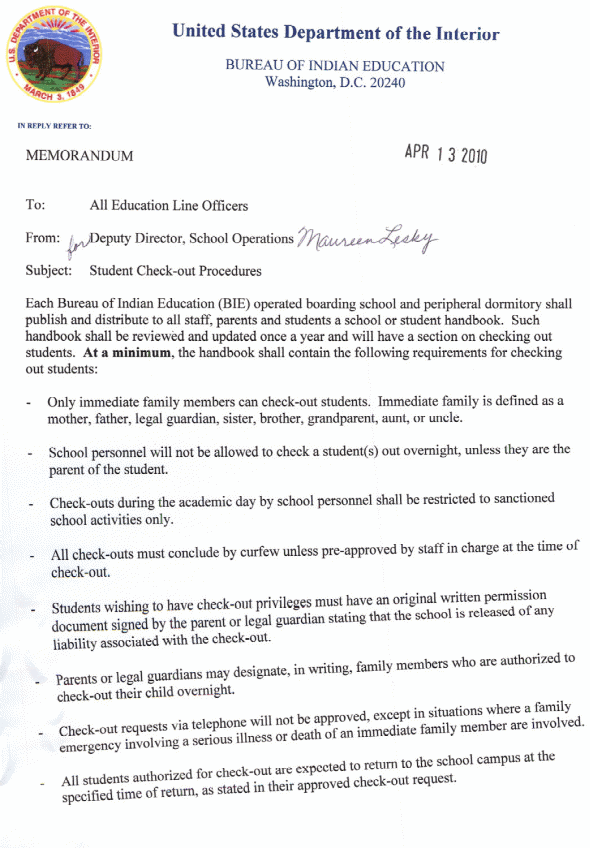
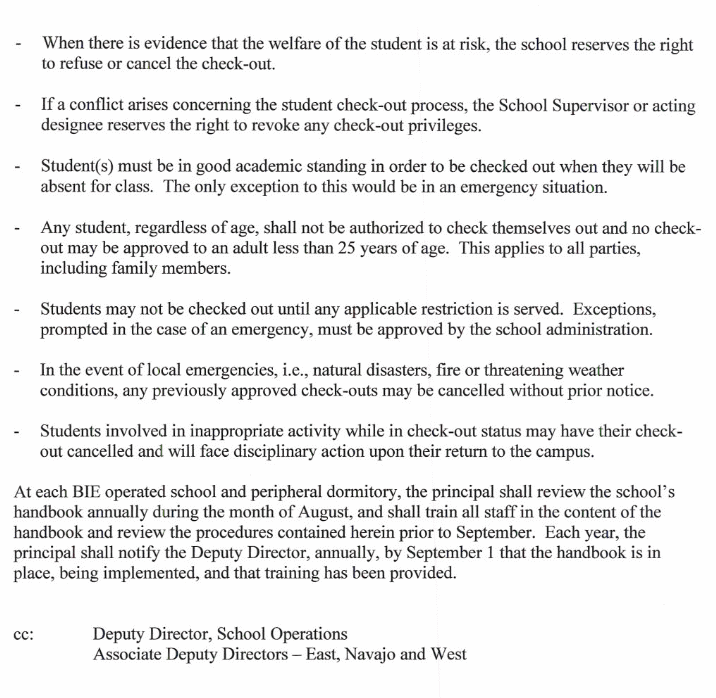
Insert school Information here.
STUDENT CHECK-OUT PROCEDURES: PARENT/GUARDIAN AND STUDENT AGREEMENT
Students may be checked out in accordance with the BIE Student Check-out Procedures attached as Appendix B. Below are the requirements for checking out a student:
Only immediate family can check-out students. Immediate family is defined as a mother; father, brother, sister, grandparent, uncle and aunt. Parents or legal guardians are required to submit a list of person(s) authorized to check-out a student. No exceptions for check-out will be granted to anyone without a written and signed request by the student’s parents or legal guardians.
School personnel will not be allowed to check-out student(s) at any time (e.g. overnight, weekdays and weekends), unless they are the parent/guardian of the student.
Check-outs during the academic day by school personnel shall be restricted to sanctioned school activities only.
All check-outs must conclude by 9:00pm curfew unless pre-approved by staff in charge at the time of check-out.
Parents or legal guardians may designate, in writing, family members who are authorized to check-out their child overnight. Authorization and approval in writing will state conditions and restrictions of check-out.
Check-out request via telephone will not be approved, except in situations where a family emergency involving a serious illness or death of an immediate family member are involved.
All students authorized for check-out are expected to return to the school campus at the specific time of return, as stated in their approved check-out request.
When there is evidence that the welfare of the student is at risk, the school reserves the right to refuse or cancel the check-out.
If a conflict arises concerning the student check-out process, the school supervisor or acting designee reserves the right to revoke any check-out privileges.
Student(s) must be in good academic standing in order to be checked out when they will be absent for class. The only exception to this would be in an emergency situation.
Any student, regardless of age, shall not be authorized to check themselves out (e.g. self-check-out) even if the student is 18 or older. Students may not be checked-out by an adult less than 25 years of age or by anyone (including family members) under the influence of alcohol or drugs. The two exceptions to the 25 year age requirement will be if the parents/guardians are under 25 year of age or if the student is under the custody of a family member who is under the age of 25. If the adult’s age is in question, the school personnel will verify the adults age.
Student may not be checked out until any applicable restriction is served (e.g. In School Suspension or In Dorm Suspension). Exceptions, prompted in the case of emergency, must be approved by the school administration.
In the event of local emergencies, e.g. natural disasters, fire or threatening weather conditions, any previously approved check-outs may be cancelled without prior notice.
Students involved in an inappropriate activity while in checked-out status may have their check-out rights cancelled and will face disciplinary actions upon their return to the campus depending on the severity of the infraction.
_________________________________________ _______________________________________
Parent/Guardian Signature Date Student Signature Date
APPENDIX C
November 4, 2015, Memorandum: Medication Administration at BIE-Operated Schools and Dormitories
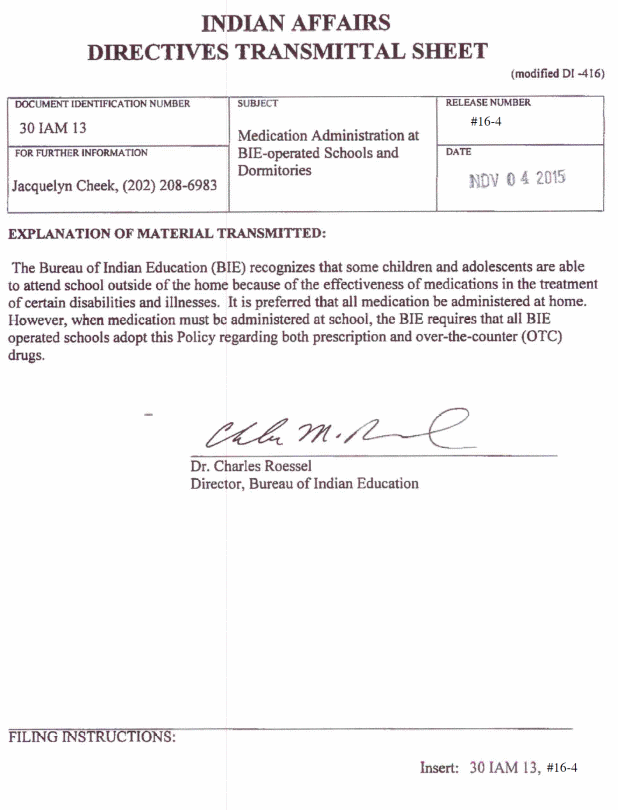
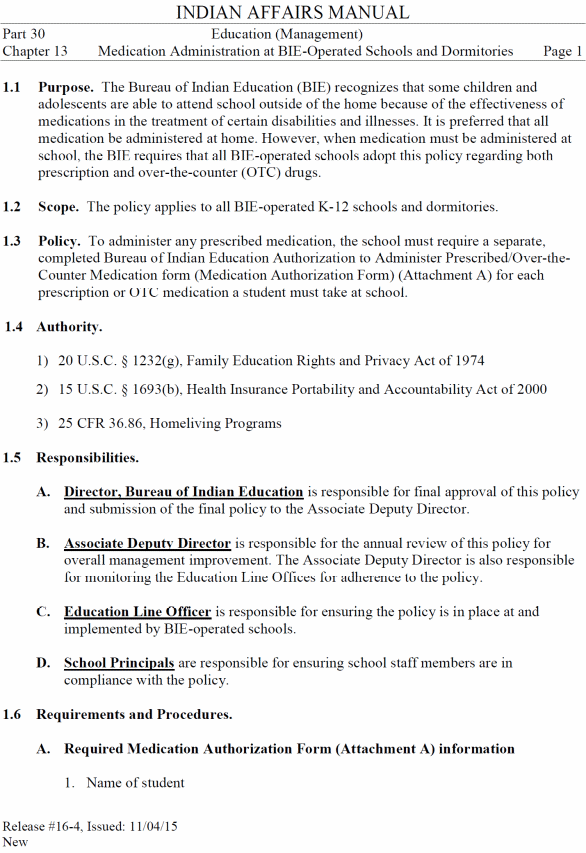
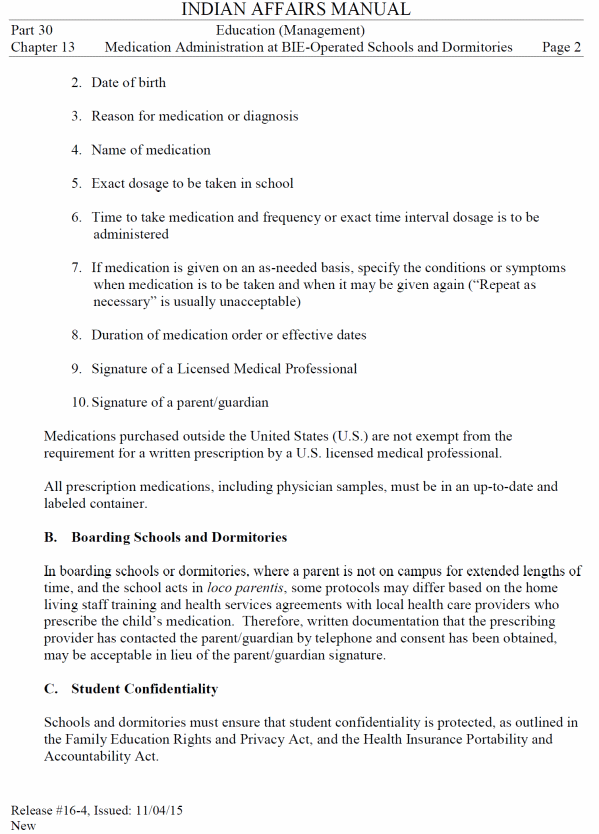
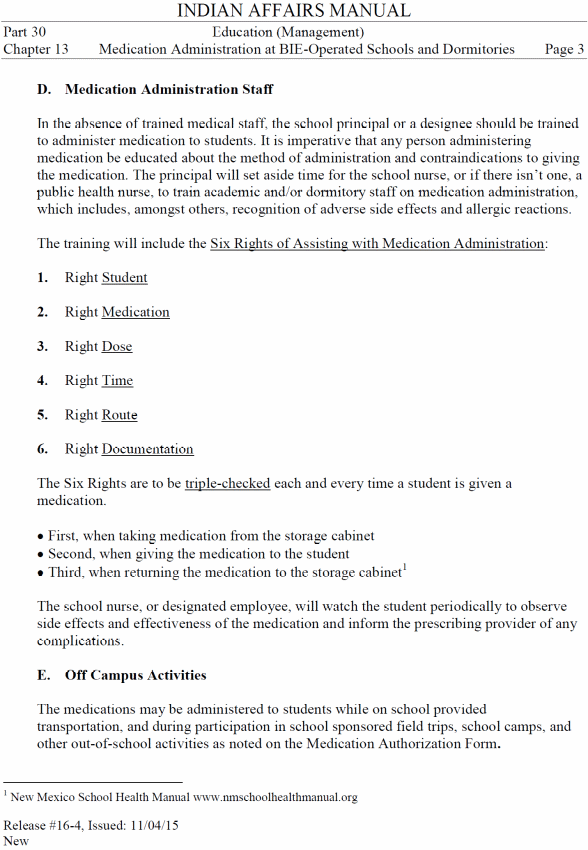
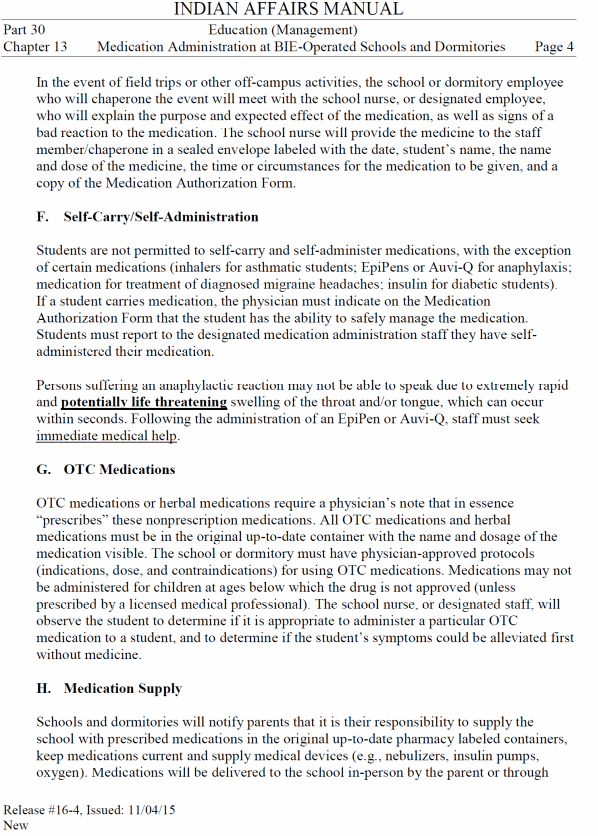
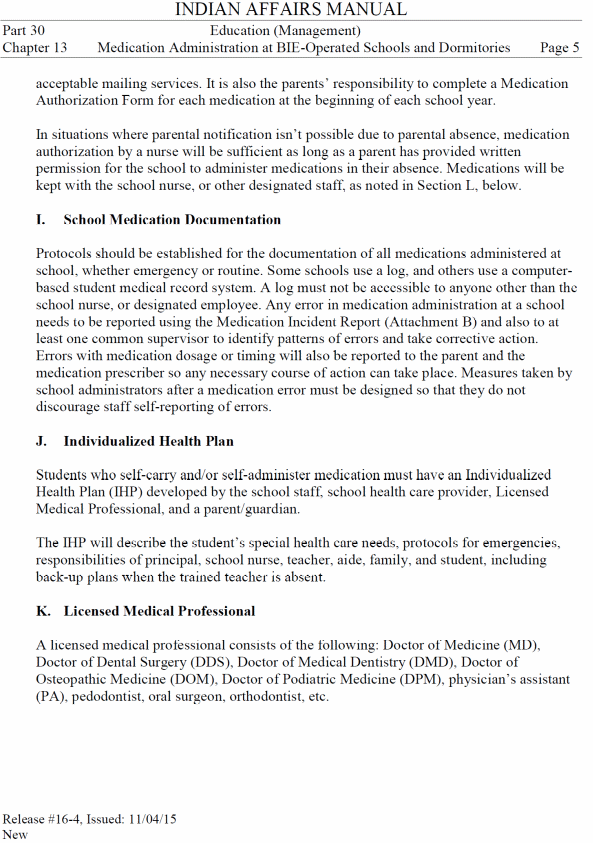
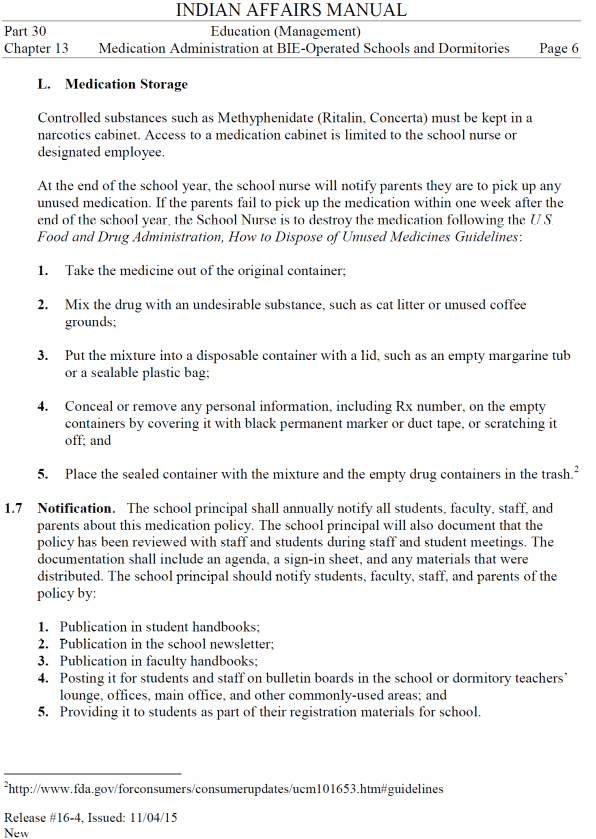
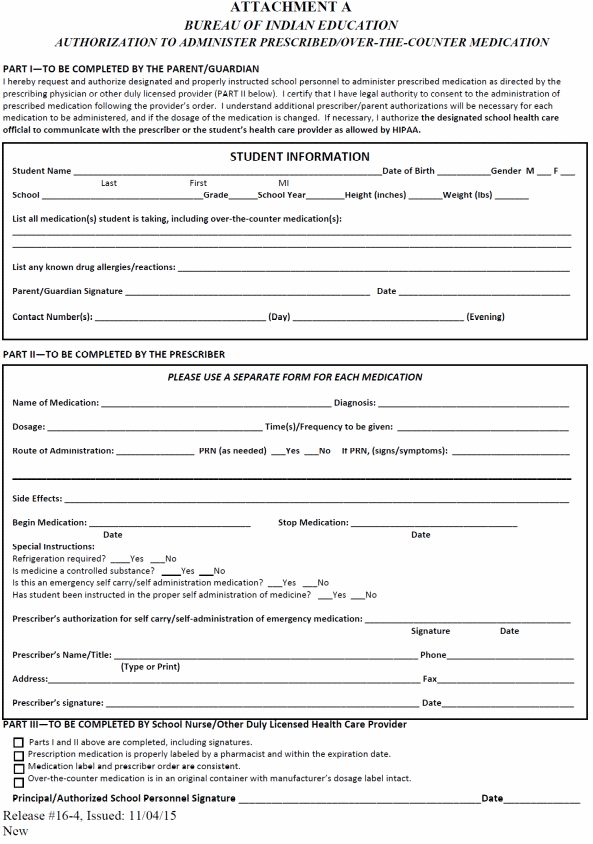
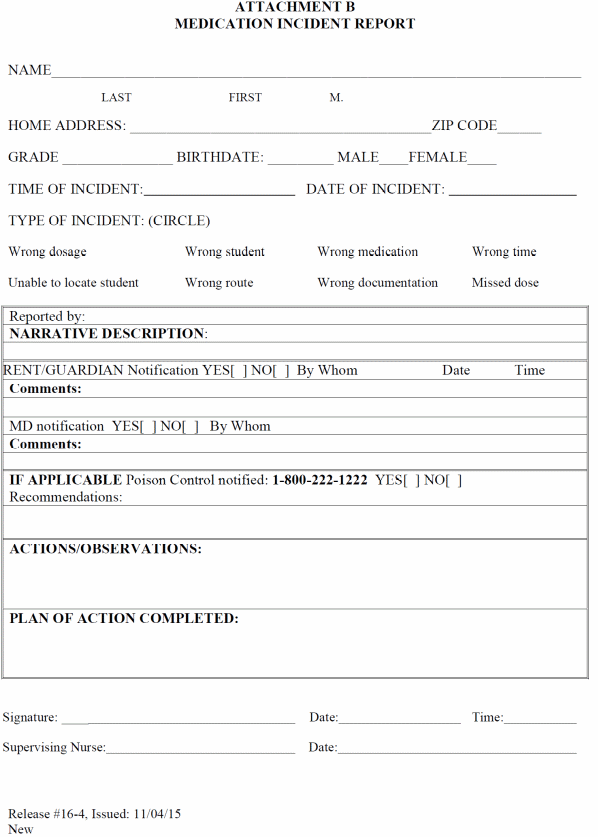
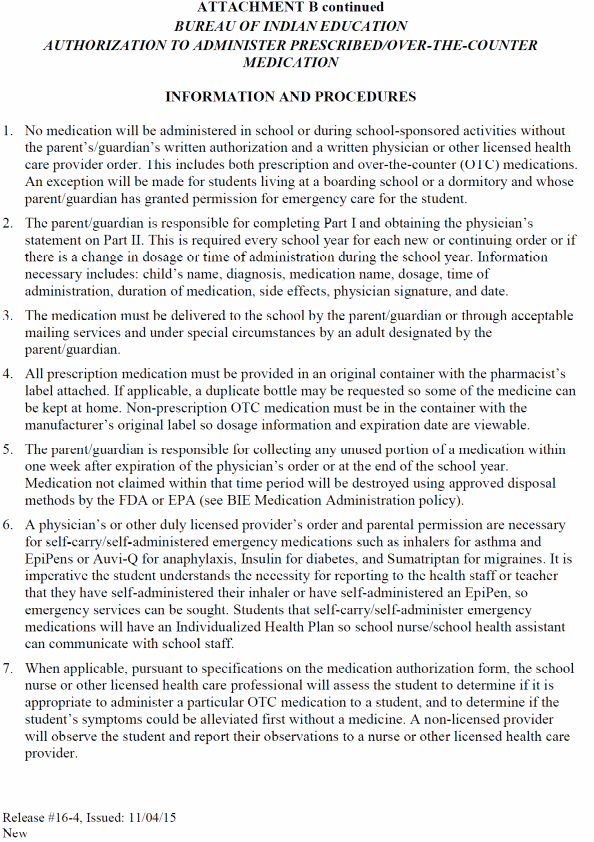
APPENDIX D
Insert other school or residential information here that does not contradict the policies or procedures of the BIE residential and student-parent handbook. If none, then delete this appendix page.
| File Type | application/vnd.openxmlformats-officedocument.wordprocessingml.document |
| File Title | SHINING STAR BOARDING SCHOOL |
| Author | LGARCIA |
| File Modified | 0000-00-00 |
| File Created | 2023-09-06 |
© 2026 OMB.report | Privacy Policy
